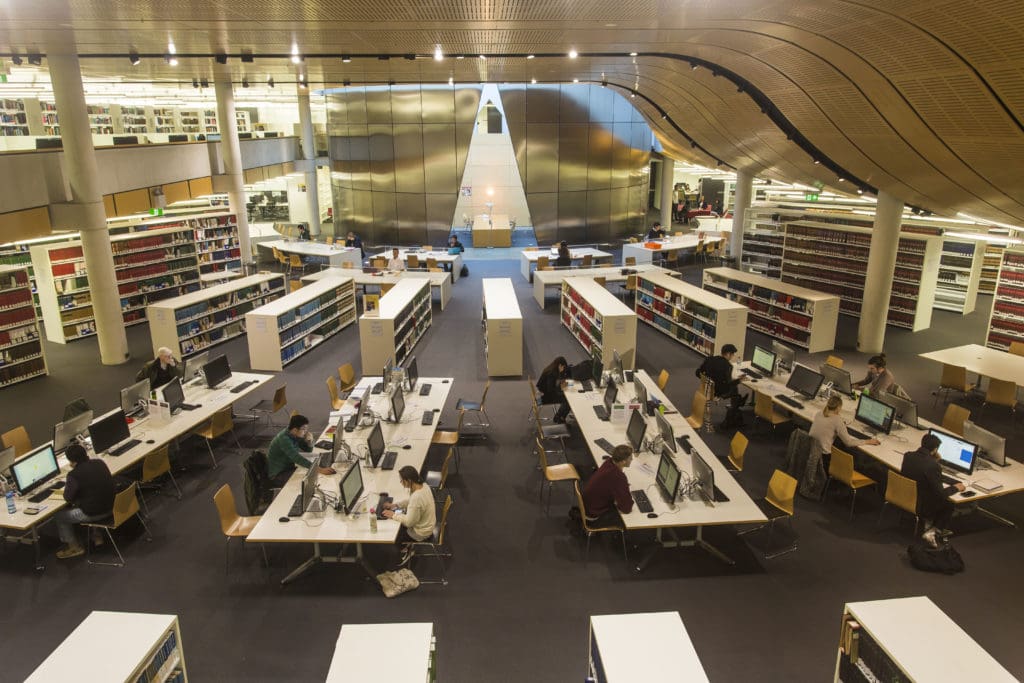Fisher Library and the Herbert Smith Freehills Law Library will resume 24/7 operations from 1 April, according to a University spokesperson.
Fisher’s hours were reduced to 12pm- 8pm on 7 August last year, at the beginning of Semester Two and during the height of Sydney’s second major lockdown.
More than seven months on, Fisher remains closed from midnight to 9am, with unstaffed and poorly-equipped learning hubs offered in its place. The initial reduction in hours was admittedly commensurate with student demand, as the majority of classes took place on Zoom, and staff and students were generally discouraged from attending campus. Additionally, management justified restricted opening hours with the need to mitigate the threat of COVID-19 transmission.
But as NSW came out of lockdown and reached a 90% vaccination rate late last year, the library remained shut during twilight hours. From 8 November, USyd students could go dancing at nightclubs yet could not study at their own library past 12am.
By the University’s own estimates, 20,000 people attended the first day of this year’s Welcome Week. We’ve now had five weeks of face-to-face classes and only now, after questioning from Honi, has USyd revealed plans to resume 24/7 operations.
So, why the fuck has it taken so long for Fisher to reopen?
When Honi put this question to the University, a spokesperson said “reduced hours during the pandemic were not a cost-saving measure but a necessary step in line with COVID requirements”.
When quizzed on what exactly those ‘COVID requirements’ were, the question was avoided altogether, but it was reiterated that “cost saving has not been a factor in our decisions around Library opening hours”.
Hours were also purportedly impacted by staff availability: “Unfortunately we have also experienced a number of staff absences due to COVID circumstances, which meant we have been unable to staff some locations at the full complement and impacted our opening hours, including evenings and weekends.”
Despite the spokesperson’s assertions, USyd’s brutal course-cutting and expedient treatment of students in the past few years suggest costs are usually a key factor in decision-making. In other words, I had my doubts.
As the University refused to give Honi any data, I set out to estimate just how much money USyd saved by limiting Fisher’s opening hours from 7 August 2021 to 1 April 2022. Currently, three Protective Services security staff are required to keep Fisher and the Lawbry running. Assuming five staff were required at the peak of the pandemic (up from the usual three), factoring in night shift loading (30%), as well as Saturday (50%) and Sunday (75%) loading, I estimate that USyd will have saved a total of 17,442 hours’ worth of security guard wages by 1 April. The lowest base rate of a professional non-academic under USyd’s Enterprise Bargaining Agreement is $30.92, which would conservatively put total savings on security wages alone at over $539,000 – a sum that was supposedly not a factor in the University’s decision-making. This calculation does not include potential savings on cleaners, clerical staff or electricity.
Although reductions in hours at some points of the pandemic were reasonable, limiting access to the library throughout last year’s exam period and during this current on-campus semester is difficult to justify. Such measures also disproportionately affect students with difficult home environments and those who do not have access to their own suitable study areas.
If nothing else, the reductions are a reminder that contemporary universities are managed like regular businesses, where opportunistic cost-cutting redirects funds toward maximising future enrolment numbers.
This management style was elucidated by Vice Chancellor Mark Scott, when he highlighted the need for USyd to adapt to changing economic conditions in an interview with Pulp Media at the beginning of his tenure.
“It would be dangerous for the University not to acknowledge that it will face change. This University would be seriously threatened if new competitors took away our supporters… our students.
“There are a myriad of companies who were in denial about how the world was changing, and they’re all studied at our business school. Rank Xerox photocopiers, Kodak cameras; there are a stack of them that failed to realise the world around them was changing.
“We’ve got to be alert to that.”
While Scott did emphasise the importance of maintaining USyd’s research, teaching and learning benchmarks, his reference to failed business ventures is emblematic of shifting priorities in the higher education sector. In the wake of Federal Government funding cuts and reduced income from international students, Universities are now, more than ever, run as corporations competing for enrolments, not as educational institutions operating for the betterment of society.
In USyd’s case, Fisher’s opening hours are a symptom of this corporate attitude, with management wielding the vague threat of ‘COVID’ as plausible justification for unprecedented cutbacks. Indeed, it is this same attitude that has led to the systemic exploitation of academic staff, the cost-saving reliance on online learning, and the annihilation of Arts courses. While profit margins and enrolment figures will likely benefit, it is currently-enrolled students who have the most to lose.





